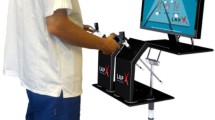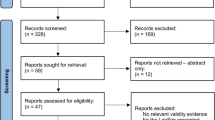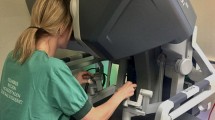Abstract
Background
Before surgical simulators can be implemented for assessment of surgical training, their construct validity should be assessed.
Methods
Nine novices (NOV), nine medical students (MS), and nine residents (RES) underwent a laparoscopic skills training on the virtual reality (VR) simulator Lap Mentor®. Assessment of laparoscopic skill was based on parameters measured by the computer system before and after training.
Results
Significant difference existed between RES and NOV at seven of nine tasks before training on the VR simulator. After the training in some tasks significant differences were observed between the experienced group (RES) and the nonexperienced groups (MS and NOV) or between medical groups (RES and MS) and nonmedical group (NOV).
Conclusions
Performance parameters of the Lap-Mentor® can be used to distinguish between subjects with varying laparoscopic experience.



Similar content being viewed by others
References
Hunter JG, Sackier JM, Berci G (1994) Training in laparoscopic cholecystectomy. Quantifying the learning curve. Surg Endosc 8:28–31
Macmillan AI, Cuschieri A (1999) Assessment of innate ability and skills for endoscopic manipulations by the Advanced Dundee Endoscopic Psychomotor Tester: predictive and concurrent validity. Am J Surg 177:274–277
Madan AK, Frantzides CT (2007) Prospective randomized controlled trial of laparoscopic trainers for basic laparoscopic skills acquisition. Surg Endosc 21:209–213
Rosenthal R, Gantert WA, Scheidegger D, et al. (2006) Can skills assessment on a virtual reality trainer predict a surgical trainee’s talent in laparoscopic surgery? Surg Endosc 20:1286–1290
Scott DJ, Young WN, Tesfay ST, et al. (2001) Laparoscopic skills training. Am J Surg 182:137–142
Gallagher AG, Ritter EM, Champion H, et al. (2005) Virtual reality simulation for the operating room: proficiency-based training as a paradigm shift in surgical skills training. Ann Surg 241:364–372
Aggarwal R, Grantcharov TP, Eriksen JR, et al. (2006) An evidence-based virtual reality training program for novice laparoscopic surgeons. Ann Surg 244:310–314
Krummel TM (1998) Surgical simulation and virtual reality: the coming revolution. Ann Surg 228:635–637
Van Sickle KR, Ritter EM, McClusky DA III, et al. (2007) Attempted establishment of proficiency levels for laparoscopic performance on a national scale using simulation: the results from the 2004 SAGES Minimally Invasive Surgical Trainer-Virtual Reality (MIST-VR) learning center study. Surg Endosc 21:5–10
McDougall EM, Corica FA, Boker JR, et al. (2006) Construct validity testing of a laparoscopic surgical simulator. J Am Coll Surg 202:779–787
Grantcharov TP, Bardram L, Funch-Jensen P, et al. (2003) Learning curves and impact of previous operative experience on performance on a virtual reality simulator to test laparoscopic surgical skills. Am J Surg 185:146–149
Gallagher AG, Satava RM (2002) Virtual reality as a metric for the assessment of laparoscopic psychomotor skills. Learning curves and reliability measures. Surg Endosc 16:1746–1752
Woodrum DT, Andreatta PB, Yellamanchilli RK, et al. (2006) Construct validity of the LapSim laparoscopic surgical simulator. Am J Surg 191:28–32
Gallagher AG, Richie K, McClure N, et al. (2001) Objective psychomotor skills assessment of experienced, junior, and novice laparoscopists with virtual reality. World J Surg 25:1478–1483
Acknowledgements
This analysis was performed in cooperation with our Chinese friends Aimin Zhang and Yiyang Dai from the Department of General Surgery, Xiao Shan First People’s Hospital, Hangzhou, P. R. China and the Department of Gastroenterology, Zhejiang hospital, Hangzhou, P.R. China during their scholarship at the Department of Surgery and Surgical Oncology, Charitè Universitätsmedizin Berlin, Germany.
Author information
Authors and Affiliations
Corresponding author
Rights and permissions
About this article
Cite this article
Zhang, A., Hünerbein, M., Dai, Y. et al. Construct validity testing of a laparoscopic surgery simulator (Lap Mentor®). Surg Endosc 22, 1440–1444 (2008). https://doi.org/10.1007/s00464-007-9625-x
Received:
Revised:
Accepted:
Published:
Issue Date:
DOI: https://doi.org/10.1007/s00464-007-9625-x




